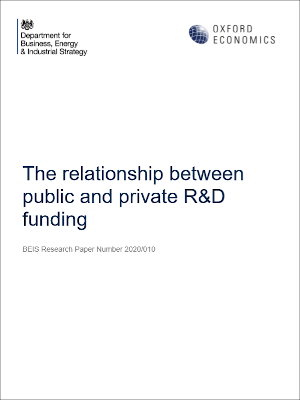Ungated Post | 17 Jul 2020
The relationship between public and private R&D funding

Oxford Economics was commissioned by the Department for Business, Energy and Industrial Strategy (BEIS), to assess the impact of public R&D support on levels of private R&D spending in the UK and other advanced economies.
Innovation enhances productivity and drives long-run prosperity. It can create new and improved products and processes, and generate cost savings for companies and the taxpayer, as well as numerous other benefits. However, a range of market failures mean that if left entirely to the market, the amount of R&D which takes place would be considerably less than optimal. These failures provide a strong case for government intervention to support R&D across the economy.
Against this backdrop, BEIS was looking to deepen its understanding of the impact of public R&D investment on private R&D investment. It commissioned Oxford Economics to undertake independent research to update the evidence base in this field using the most recent and comprehensive datasets, and through the application of the latest analytical techniques.
For the UK, we found that each £1 of public R&D stimulates between £0.41 and £0.74 of private R&D within the same year. In the long run, the same £1 of public R&D eventually stimulates between £1.96 and £2.34 of private R&D (inclusive of the impact in the first year).
Alongside our analysis of the UK, we estimated the link between public and private R&D rates for nine other OECD countries. We found a wide variation in the impacts of public R&D on private R&D across countries. The greatest impact was found for Japan, where £1 of public support would stimulate £3.16 of public investment in the long term. In contrast, the same £1 of public support in Spain would encourage just £1.21 of private investment.
Our economic consulting team are world leaders in quantitative economic analysis, working with clients around the globe and across sectors to build models, forecast markets and evaluate interventions using state-of-the art techniques. Lead consultants on this project were:
Oxford Economics’ team is expert at applying advanced economictools that provide valuable insights into today’s most pressing business, financial,and policy issues.
To find out more about our capabilities, contact:
EMEA
Sam Moore
+44 (0)207 803 1415
Email
Americas
Hamilton Galloway
+1 (646) 503 3068
Email
Asia
Rhianne Clark
+65 6850 0112
Email
Related Services

Post
The Economic Footprint of JLR in the UK
This report examines the economic footprint of JLR in the United Kingdom in 2024. The analysis is conducted both at the national level, as well as on the West Midlands and North West regions, where JLR’s main facilities are located.
Find Out More
Post
Airbnb’s Economic Contribution to APAC in 2024: GDP, Jobs, and Regional Impact
Airbnb's platform connects hosts across Asia Pacific (APAC) with travellers from around the world. Oxford Economics was commissioned by Airbnb to quantify its economic footprint in 10 APAC markets in 2024.
Find Out More
Post
Economic Insights: Airbnb’s Contribution Through the Lens of Oxford Economics
Oxford Economics Australia delivered a tailored economic impact assessment for Airbnb, including GDP contribution modelling, job creation analytics, guest‑spend segmentation, and regional tourism dispersion insights to underpin Airbnb’s stakeholder communications and strategic growth initiatives.
Find Out More